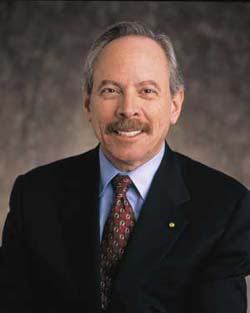2005-2006 Provost Lecture Series
 The Current Context for Science, Society and Public Policy
The Current Context for Science, Society and Public Policy
Thursday, March 2, 2006
3:30 p.m. to 5:00 p.m.
Hemisphere Room, Hale Library
Alan Leshner
CEO of the American Association for the Advancement of Science and
Executive Publisher of Science
Abstract
The health of science and its ability to serve society are determined by a convergence of national funding priorities, societal attitudes about science, and events ongoing within the enterprise itself. All of these are undergoing some dramatic changes. The overall science-society relationship is healthy but is experiencing significant stress that is changing the climate for science. Some of the stress results from the fact that many advances in science are now encroaching on issues that relate to core human values. The increased tension in the science-society relationship requires a new form of dialogue between the scientific community and the general public.
Biographical Sketch
Dr. Leshner has been Chief Executive Officer of the American Association for the Advancement of Science and Executive Publisher of the journal Science since December 2001. AAAS (triple A-S) was founded in 1848 and is the world's largest, multi-disciplinary scientific and engineering society
Prior to coming to AAAS, Dr. Leshner was Director of the National Institute on Drug Abuse (NIDA) from 1994-2001. One of the scientific institutes of the U.S. National Institutes of Health, NIDA supports over 85% of the world's research on the health aspects of drug abuse and addiction.
Before becoming Director of NIDA, Dr. Leshner had been the Deputy Director and Acting Director of the National Institute of Mental Health. He went to NIMH from the National Science Foundation (NSF), where he held a variety of senior positions, focusing on basic research in the biological, behavioral and social sciences, science policy and science education.
Dr. Leshner went to NSF after 10 years at Bucknell University, where he was Professor of Psychology. He has also held long-term appointments at the Postgraduate Medical School in Budapest, Hungary; at the Wisconsin Regional Primate Research Center; and as a Fulbright Scholar at the Weizmann Institute of Science in Israel. Dr. Leshner's research has focused on the biological bases of behavior. He is the author of a major textbook on the relationship between hormones and behavior, and numerous book chapters and papers in professional journals. He also has published extensively in the areas of science and technology policy, science education, and public engagement with science.
Dr. Leshner received an undergraduate degree in psychology from Franklin and Marshall College, and the M.S. and Ph.D. degrees in physiological psychology from Rutgers University. He also holds honorary Doctor of Science degrees from Franklin and Marshall College and the Pavlov Medical University in St. Petersburg, Russia. Dr. Leshner is an elected fellow of AAAS, the National Academy of Public Administration, the American Academy of Arts and Sciences and many other professional societies, is a member of the Institute of Medicine of the National Academies of Science, and has received numerous awards from both professional and lay groups.